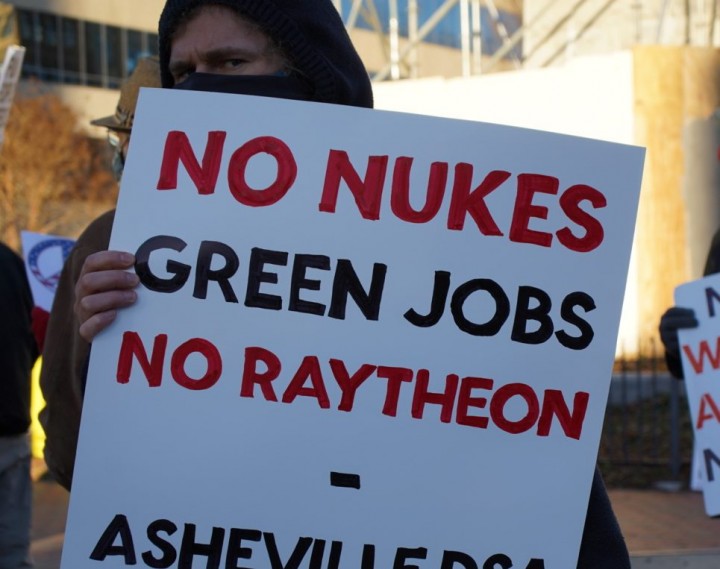We have much more to learn about how we as a society can move away from a war economy to one that is just, environmentally sustainable, and locally based. Reject Raytheon has as one of its goals:
“to present alternatives to the war economy, such as sustainable economic development; investments in health, education, clean energy, infrastructure; and reparations.”
We begin to achieve that goal here. Below is an analysis of the war economy and a move to a “living economy.”
Spending in the military sector of the economy generates less jobs and income than spending in other sectors of the economy
Scholarly research has conclusively documented the fact that military spending creates fewer jobs than other sectors of the US economy. $1 billion in military spending creates approximately 11,200 jobs, compared with 26,700 in education, 16,800 in clean energy, and 17,200 in health care. (1) Even factoring in the fact that the average salary in the defense industry is much higher than in any of the above industries, the total wage dollars generated by $1 billion in spending is less for military spending. (2) An excellent in-depth analysis of this, as a supplement to the analysis done below, was done by Robert Pollin and Heidi Garrett-Peltier at the University of Massachusetts, Amherst in 2007 (3). While this data is somewhat dated, it is not likely that anything has substantially changed.
There are three reasons why military spending generates fewer jobs than other industries:
- Industries such as education and clean energy are more labor-intensive. For a given level of spending, more of those dollars go toward hiring workers and less on equipment and materials.
- A greater percentage of spending in education, health care, and clean energy construction stays within the US, creating more domestic jobs. Military personnel spend more of their earnings abroad, and foreign contractors and employees get some portion of Pentagon spending.
- Since wages and benefits are lower in sectors other than the military, the same amount of money hires more people in those non-military sectors. (1)
If the US had channeled resources into expanding the clean energy industry, broadening health care coverage, and increasing educational opportunities, between 2001-2019, 1.4 – 3 million more jobs would have been created, reducing unemployment significantly. (1)
What are the principles that our society, economy, and businesses should be built on?
David Korten, of the Living Economics Forum (4), has done extensive research and speaking on what a sustainable economy should look like. This material is summarized below
Communities and Societies
1. When people organize as member of communities in which they know and care about one another, they share a sense of responsibility for their common well-being that allows democracy to flourish.
2. The best indicators of the health of societies are the conditions of the most vulnerable among us, both humans and endangered species. Healthy societies will ensure that there is no discrimination based on race, sex, sexual orientation, gender expression, disability status, age, religion, and national origin.
The Economy
1. We must manage the economy and our human reproduction to keep our consumption in balance with the Earth’s regenerative capacity.
2. The proper purpose of an economy is to secure just, sustainable, and joyful livelihoods for all.
3. Communities with a high degree of self-reliance in energy and materials (eg food and housing) are more likely to manage their environmental resources responsibly for the long-term.
4. Government has an essential role to play in protecting our rights and freedoms, as the guardian of many of the conditions related to efficient market function, such as maintaining public infrastructure, protecting the environment, and regulating corporations and interstate commerce. Government should also prohibit unregulated monopolies.
Businesses
1. Businesses should serve public purposes and the community.
2. Public policy should favor local investors and businesses dedicated to creating community wealth, who generally have strong roots in the community, over investors and businesses that come only to extract wealth from the community.
3. Small businesses, in which participants can maintain relationships of mutual trust, caring, and accountability, tend to be highly productive and innovative, contribute to building and maintaining the social fabric of the community, provide a more satisfying work life for their members, and allow greater possibility for real participation in decision making.
What are the strengths and weaknesses of the proposed Raytheon/Pratt and Whitney plant, using the above principles set out by David Korten for a model community, economy, and businesses?
Strengths:
1. The plant will pay an median salary of $55,000 annually. This is much higher than the current average salary in Buncombe County. It is, however, below the average defense industry salary.
Weaknesses:
1. Because it is a defense plant, it creates fewer jobs that most other industries that Buncombe County could attract to this site.
2. The plant does not serve a public purpose. We can argue that war is the opposite of a public purpose.
3. Buncombe County government should be a steward of the local environment. Although the plant has passed environmental review so far, past PW plants have had severe environmental issues, and 90 environmental lawsuits have been filed against P&W plants.
4. This plant will build engines for airplanes, some of which are military aircraft. Airplanes produce air pollution, which in turn contributes to the existential threat of global warming.
5. The plant does not contribute to local self reliance, because the parts are shipped outside of WNC, and to foreign countries.
6. Public policy should favor local investors and businesses dedicated to creating community wealth, who generally have strong roots in the community, over investors and businesses that come only to extract wealth from the community. PW is extracting wealth from Buncombe County. The profits from the plant will not be invested in the local economy.
7. We should prohibit unregulated monopolies and absentee ownership. We can argue that the MIC is composed of a few large companies, which is close to a monopoly. Not only is the MIC unregulated, in fact the MIC “regulates” the government, thru their massive lobbying effort, that gets them all the defense contracts they desire. And the PW plant is definitely absentee ownership.
What are the practical steps that we can take to encourage sustainable development and a sustainable economy in Buncombe County?
1. We should encourage our local economic development organizations to encourage and subsidize development of businesses that:
– Are locally focused, serve a public purpose and the community, and contribute to building and maintaining the social fabric of the community.
– Contribute to local self-reliance in energy and materials.
– Are either environmentally neutral, or contribute to the health of the local environment.
– Include local investors as their principals, who are dedicated to creating community wealth.
2. We should demand that our local governments go on record as opposing bringing any future businesses to Buncombe County related to the MIC.
3. Since the best indicators of the health of societies are the condition of the most vulnerable among us, we should ensure that our local governments do everything in their power to protect and enable these populations.
References
1. Aftergood, Steven, Crawford, Neta C., and Peltier, Heidi, “Costs of War”, Watson Institute of International and Public Affairs, Brown University, https://watson.brown.edu/costsofwar/costs/economic/economy/employment, page updated as of March 2019
2. I was not able to find precise apples to apples comparisons. I used the following sites:
https://www.ziprecruiter.com/Salaries/Defense-Industry-Salary
As of Feb 6, 2021, the average annual pay for a Defense Industry worker in the United States is $88,941 a year.
https://www.ziprecruiter.com/Salaries/Hospital-Staff-Salary
As of Feb 6, 2021, the average annual pay for a Hospital Staff in the United States is $67,844 a year.
https://www.salary.com/research/salary/alternate/high-school-teacher-salary
The average High School Teacher salary in the United States is $62,101 as of January 29, 2021
https://www.salary.com/research/salary/benchmark/teacher-elementary-school-salary
The average Teacher Elementary School salary in the United States is $59,509 as of January 29, 2021,
There are obviously paraprofessionals, secretaries, and custodians who make much less than teachers, but there are also administrators who make much more than this amount. And if you include higher education, the salaries would be much higher. But for daycare centers, the salaries would be much lower.
Following is interesting salary data:
The average School Secretary salary in the USA is $37,274
The average Custodian salary in the USA is $25,756 per year
The average Assistant Principal salary in the USA is $89,684 per year
The average Principal salary in the USA is $118,198 per year
For this analysis, we use $55,000 as the average salary in education.
Using the above, we have the following:
Defense: 11,200 jobs * $88,941 avg salary = $996M in generated revenue (which is close to the $1 billion figure used in citation #1 for $1 billion in military spending)
Health Care (using hospital data): 17,200 * $67,844 = $1.167 billion
Education (using $55,000 as the average salary): 27,600 * $55,000 = $1.469 billion
The above analysis shows that Health Care spending would generate 17% more revenue for the US economy than defense spending, and education would generate 47% more revenue.
Furthermore, as stated by Aftergood et al in citation #1 above, industrial sectors other than the military tend to generate jobs in the US, whereas military personnel spend some of their earnings abroad, and some portion of Pentagon spending is spent outside the US, on foreign contractors and employees. Therefore, the multiplier effect of generating more domestic jobs is higher for non-military industries.
3. Pollin, Robert and Garrett-Peltier, Heidi, “The U.S. Employment Effects of Military and Domestic Spending Priorities”, Department of Economics and Political Economy Research Institute, University of Massachusetts, Amherst, 2007
4. Website of David Korten, https://davidkorten.org/the-new-economy/



